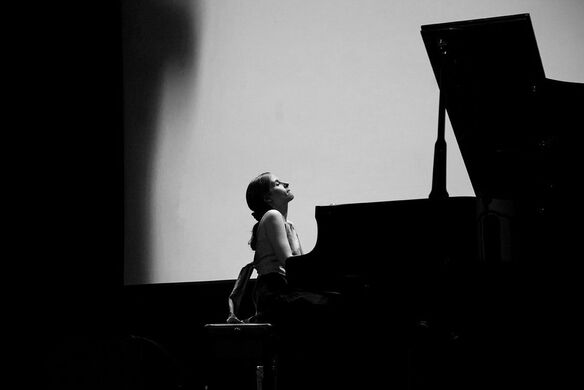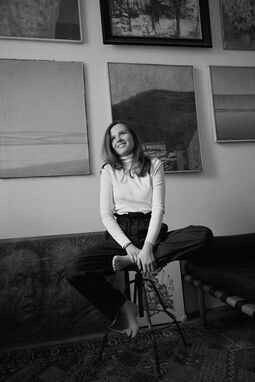Menu
|
“If someone fine, dignified, prolific, brilliant is born in the future; if someone unique and unrepeatable is born, a Bach, a Rembrandt, then he will win people over, charm and seduce them.” Witold Gombrowicz, the controversial Polish author, was in fundamental opposition to most things, but he had never lost hope for the art and the artist. “Are you the person that Gombrowicz describes?,” I ask Hania Rani when I interview her before her concert in Bern in December 2019. “Are you the new Bach?” She laughs. “I would never put myself in this group of people. Gombrowicz is an excellent observer of life and of the meaning of life. But he also sees the irony in it.” Hania Rani is a pianist, composer and musical arranger from Poland. This year is her first with international fame, after having released her debut album “Esja” in April of 2019. The album is included in many best-of lists of 2019. On her debut, Hania Rani performs ten compositions for solo piano, each one a gem of a new musical style that has become very popular recently, usually branded as neo-classical. Her music has brought Hania Rani to numerous venues in Europe this year, to Aarhus in Denmark for instance, where she played an acoustic set for a handful of people in a jazz club, to the Netherlands, where she performed in a church, but also to Japan, where she played in a big hall in front of over 1000 people. “How is your new life on the tour?,” I ask Hania Rani. “How do you stay healthy and in good spirits while traveling so extensively?” “In the beginning it wasn’t easy,” she says. “But because it is a job like any other job, I must stay focused. I have to repeat the same show every day and give a lot to the people every evening. It was difficult in the beginning, but I got used to it because I really like to perform. It is something that lifts me up.” “Don’t you get bored after a while, playing the same show every evening?” “Well, it’s always changing,” Hania Rani replies, “because we play in different cities and different venues. I also try to take my time before and after the concert, to get to know the places and the people for whom I am playing. I want to establish a connection, something that I can remember later on. It’s my first big tour and I want to fully experience and enjoy it.” “Esja”, Hania Rani’s album, was partly recorded in Reykjavik, Iceland’s capital, and is named after a nearby mountain. The music on “Esja” is sublime and laid back in a very delicate way, with Hania Rani carefully finding her way through the songs just as my car does when I drive to the office through the falling snow a few days before the concert (while playing her music). One of the trademarks of neo-classical piano music is to showcase the piano as an organic and mechanical body. When listening to songs like Biesy, Luka and Glass, one hears Hania Rani press the keys and play the melodies of course, but one also hears a piano at work, creaking and breathing like a wooden boat in heavy sea. The first thing that strikes me when meeting Hania Rani in person and seeing her in concert: she is profoundly relaxed and unaffected by the hustle and bustle of a life on the road. She is late for the soundcheck and we don’t have time to do the interview? No problem, she says, let’s talk over dinner, just minutes before she goes on stage. The audience in Bern is very mindful and ready to receive. Couples kiss when Hania Rani plays and heads turn around in contempt when someone struggles to silently open a plastic wrapper. This is a liturgy of divine sound, for Christ’s sake: who is the heretic in the room? Hania Rani links two, three songs and plays for 15 minutes in one go. At the end of such a run nobody dares to applaud until they are 100% sure that this is really the end. No one wants to kill the sublimity of the moment, and uncover himself as hopelessly ignorant, by clapping when clapping is not yet due. We all know that if someone speaks softly, people listen better. With Hania Rani and her music it is the same. "For me, what I do is punk." But who is Hania Rani really? For her Instagram profile she uses another Gombrowicz quote. “Je suis un humoriste, un plaisantin, je suis un acrobate et un provocateur”, it reads. “I like this quote,” Hania Rani tells me, “because it says a little bit how I feel as an artist. I am an entertainer, that’s my job.” And she repeats: “I’m an entertainer.” However Gombrowicz’s original quote has a second, more subversive part - “je suis cirque, lyrisme, poésie, horreur, bagarre (a brawl), jeu, que voulez-vous de plus?”. Witold Gombrowicz was called a proto punk, a punk before punk was born, for swimming against the currents of his time. Hania Rani doesn’t look punkish at all, but “I like to be a punk in my mind,” she says, when I ask her about it. “For me, what I do is punk. I used to play classical music. Everything I do now is a total rebellion.” Hania Rani’s second album has already been recorded and mixed and will be out sometimes in 2020. The album will be different than “Esja” and Rani risks to disappoint some of her newfound fans of 2019 which slightly worries her. There will be a couple of solo piano songs - of course - but the rest of the album will have much more instruments as it was recorded with a small band. Already in Bern Hania Rani surprised some in the audience when she was singing (she is probably the best piano player among all the singers in the world). When she announced on Facebook that mixing the new album was completed, she also noted that “Nothing has changed. Everything has changed”. Hania Rani likes to tease her followers by publishing enigmatic messages online. “On the one hand everything has changed in my life because of ‘Esja’,” Hania Rani explains. “I am now in a totally different place and I am doing totally different things. I also have many great offers to collaborate. On the other hand I think that I am quite the same as before my success and I try to lead my life the same way.” “So Hania Rani is still Hanna Raniszewska?” “Yes!” (photo credits:: Aleksandra Pawlowska, Nat Kontraktewicz,, Marcin Leszczynski..)
2 Comments
|
EditorKurt is based in Bern and Beirut is his second home. Always looking for that special angle, he digs deep into people, their stories and creations, with a sweet spot for music. Archives
September 2020
Categories
All
I'd love to discover you. Share your creations here.
|




 RSS Feed
RSS Feed
